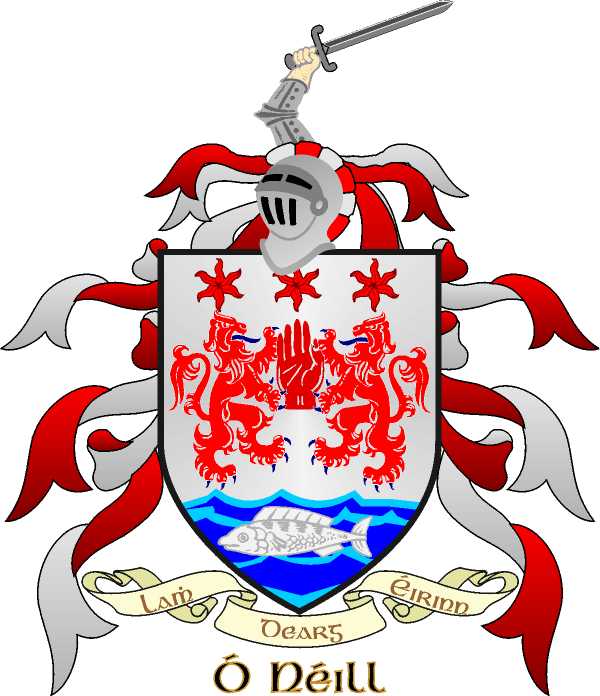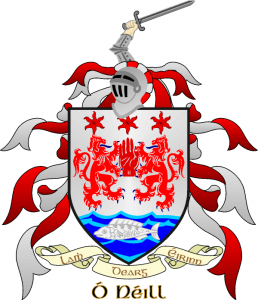I wanted to talk about my Irish ancestry today, given the holiday that we here in America celebrate our Irish heritage with parades and bar crawls. For most of my life, I never knew I was Irish. I was well aware of my English and German lineage growing up but anyone who could have told me about being Irish was long dead by the time I entered the world. As I began doing my genealogy in my 20s, I discovered, much to my surprise, that I am Irish and French in equal parts to being English and German. Not only am I Irish and French but my lineage directly descends from some of the most illustrious families in those countries.
You see, I am a member of the ancient and royal O’Neill clan in Ireland.
It goes like this. My mother’s parents were Samuel Jewett and Lois Heald. Lois Heald’s parents were Normand Heald and Esther Newell. Esther Newell’s parents were Benjamin Newell and Nellie Rulon. Benjamin Newell’s parents were Thomas Newell and Sarah Jane Mock. Thomas Newell’s parents were Thomas Newell Sr. and Rosannah McIlheny.
Now we get into the Irish people.
Thomas Newell’s maternal side looks like this.
Rosannah McIlheny’s parents were Felix McIlheny (spelling varies as McIlheny or McElhiny) and Jane Orr. Although Jane was born in Massachusetts, Felix was born in Fermanagh, Derry County, Ireland, in 1755. He immigrated to the American Colonies as a child – Pennsylvania, I think – and enlisted in the Revolutionary War at Hopewell, Pennsylvania, in 1775. He was a Corporal in the 6th Pennsylvania Battalion, serving under Captain David Grier, who was under Colonel William Irvine. At the battle of Three Rivers on June 8, 1776, he was captured and held prisoner in Quebec, where he was later paroled from military service on August 9, 1776. A year later, he married Jane and settled in Virginia to have a bunch of babies. Pension application paperwork in 1818 shows that he was living in Kentucky. Soon he moved again to Ohio to be near his daughter and requested that his pension be paid there. He died in Ohio in 1841. It appears that his grandfather, Robert, came from Scotland to Ireland in the 1600s but I haven’t been able to trace the genealogy beyond him.
I think Felix’s mother, Agnes Crawford, was born in Gettysburg, Pennsylvania in 1719-ish but that means she would have had to go to Ireland in order for Felix to have been born there. Something about that doesn’t strike me as correct but if Felix came from Crawfords on his maternal side, they were Irish as well. It may be as simple as Agnes’ birthplace being recorded incorrectly because everything else matches. Her father was William Crawford of Donegal, Ireland.
Thomas Newell’s paternal side looks like this.
Thomas Newell Sr. was born in 1779 and his parents were Robert N. Newell of Ireland and Christina Williams of Germany (?). He was from Westmorland, Pennsylvania, but married Rosannah McIlheny (as seen above) in Kentucky in 1803. The family states that he was a soldier in the War of 1812 but I haven’t been able to search for documentation yet. After the war, he settled in Ohio and had a brood of children, eventually dying there in 1824.
Robert N. Newell came from Down, Ireland, and he was born in 1749. He came to America at 16 and settled in Westmoreland, Pennsylvania, in 1776. He was a weaver by trade and a Presbyterian.
This is where things get a little hairy. The family tree takes an abrupt shift here and says Robert N. Newell’s father was Hugh O’Neall, born in Shanes Castle, Ireland, in 1698. It is said that Hugh came to the American Colonies on a British Navy vessel and jumped ship in Christina, Deleware, and changed the spelling of his name in this country. Allegedly he married Anne Cox and had numerous children. Hugh claimed to have come from the O’Neill clan of Shanes Castle in Ireland, which was a very ancient and royal Irish family. He was third in line to inherit and decided to go to America instead. There are several sources to cite this as correct but it is disputed by other people. I don’t have access to records that could prove or disprove Hugh’s claims. If there were concrete records, it wouldn’t be disputed. We just don’t know for sure. My theory is that “Newell” is a corrupted version of “O’Neall” and that’s how the name changed. They sound similar.
Whether or not I actually am an O’Neill (I think I am), we know for certain that I am a McIlheny and Crawford, which are Irish families.
Now let’s go have a drink.
Read More
















